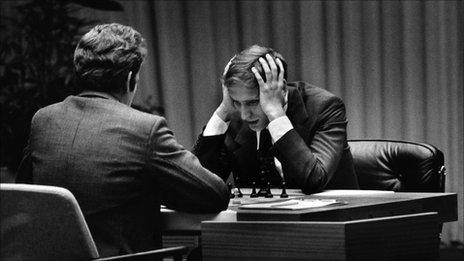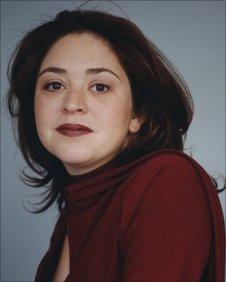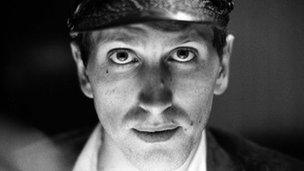Bobby Fischer film charts rise and fall of chess genius
- Published

The Bobby Fischer v Boris Spassky tournament gripped the world in 1972
A documentary on the life of chess genius Bobby Fischer opens in cinemas this week. Its director Liz Garbus explains the challenges of telling the story of a child prodigy who turned controversial recluse.
"If chess knowledge was a swimming pool, I was in the shallow end," says Liz Garbus, director of documentary Bobby Fischer Against the World.
"As we explore in the film, the deep end knows no bottom."
Garbus's documentary is a portrait of the American chess player which focuses on his famous 1972 tournament in Iceland against the Russian Boris Spassky.
The matches were as much about the Cold War as they were about chess. Fischer v Spassky dominated headlines around the world.
"It was moment when metaphor wrapped upon metaphor," says Garbus.
"It was as black and white as a chess board. Here was this lone American against this team from the Soviet Union who honed and nurtured their chess players.
"Even their names - Bobby and Boris - were quintessentially American and Russian."

Garbus was Oscar-nominated for her documentary The Farm: Angola, USA
In her documentary, Garbus explores the wider issues of whether Fischer was ever equipped to deal with the pressures of fame.
The film also highlights the thin line between genius and madness.
"We have seen over time that starting incredibly young or being in a relentless spotlight is an enormous burden for an individual," says Garbus.
"Rather than chess making Bobby insane, chess is what kept Bobby sane. That drive to be world champion kept him organised, so when he achieved it that order was lost."
During the documentary Fischer is described as "the Mozart of chess".
In 1958, at the age of 15, he became the youngest chess Grand Master in history.
Raised by his mother in Brooklyn, he had taught himself to play chess aged six. As archive footage shows, he appeared regularly on TV throughout the 1960s.
Radio rants
But his increasingly erratic behaviour at the Spassky tournament in 1972 was an indicator of how his life would spiral out of control.
His later years were marked by anti-Semitic rants, despite the fact that both his parents were Jewish.
As part of her research Garbus and her team trawled through recordings of Fischer's calls to radio shows from the 1990s onwards.

Bobby Fischer became a chess Grand Master aged 15
"It's one thing if you listen to someone ranting about 9/11 or the Jews for five minutes. It's another if you listen to them for 200 hours," she says.
"You realise this is not a thoughtful ideological position, this is like a train that's going with no brakes on."
Garbus became fascinated with the Bobby Fischer story when she read his obituary on a flight to Utah for the Sundance film festival.
Fischer died in Iceland in 2008 at the age of 64.
He had been granted Icelandic citizenship in 2005 as a way to avoid being deported to the US.
He was wanted for breaking international sanctions by playing a rematch with Spassky in the former Yugoslavia in 1992.
"I became obsessed and starting reading up on him - and I was at Sundance so I was all jazzed up creatively," Garbus says.
She spent a year trawling for material in "a scavenger hunt around the globe".
One of her best finds was photographer Harry Benson and a trove of previously unseen shots of Fischer taken for Life magazine, including a toned young Fischer working out in the gym.
"Looking at footage of Bobby as a young man you see how charismatic and good-looking he was," says Garbus.
"He really seemed to inhabit that rock star role for a time."
Bobby Fischer Against the World is released in the UK on 15 July
- Published4 July 2011